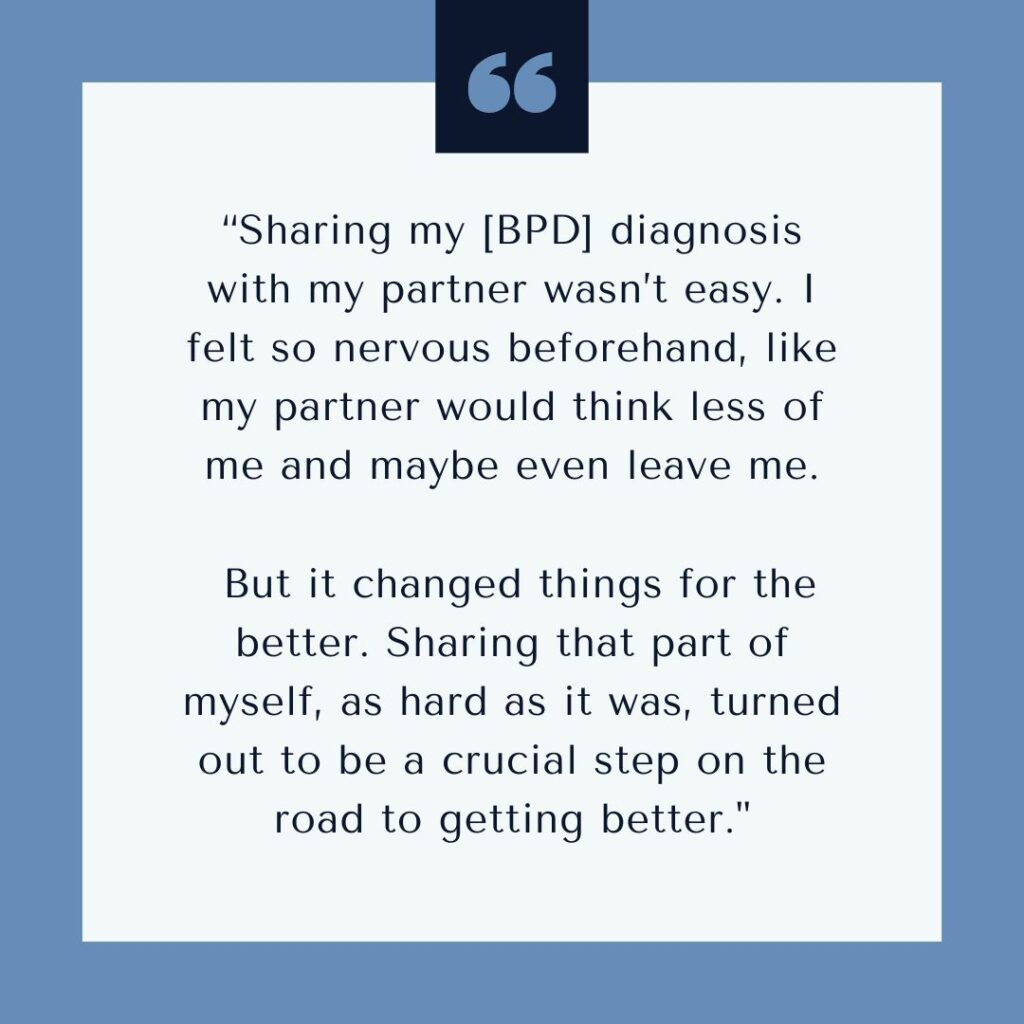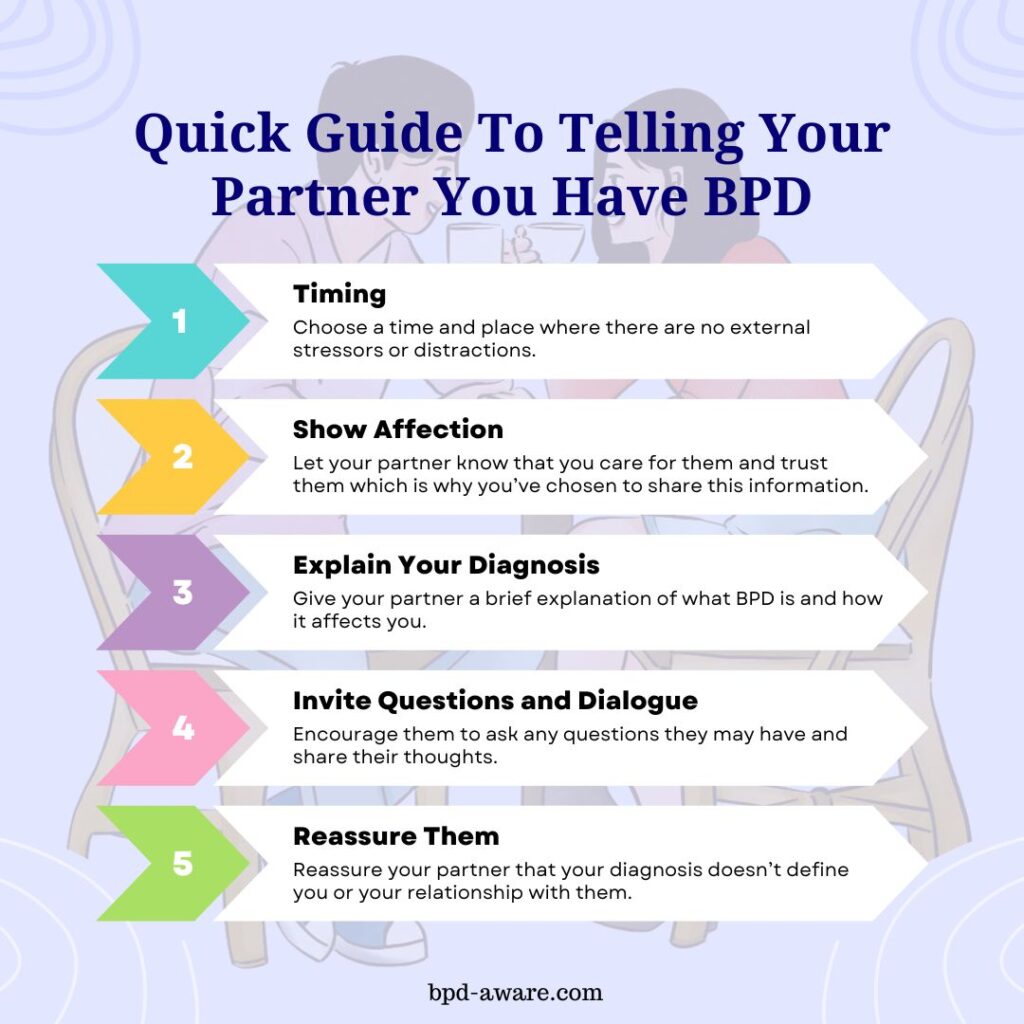Being diagnosed with Borderline Personality Disorder (BPD) is one of the most important times in your life. It can clarify experiences and challenges you have faced but it can also mark the beginning of a difficult journey. One of the most delicate steps on this journey is telling your partner about your diagnosis. The purpose of this article is to guide you on when and how to have this conversation. It will also prepare you for the type of feedback you may receive.
When’s The Right Time To Tell Your Partner You Have BPD?
Deciding the right time to share your BPD diagnosis with your partner is a personal choice, heavily influenced by the level of trust and openness in your relationship. Once you feel safe in the relationship, consider bringing it up and trust that your partner is someone who will do their best to understand and support you. It’s important to share this part of your life when you’re both in a quiet, comfortable environment free from distractions and stress.
In particular, romantic relationships are built on trust that develops over time. It is often useful to wait until you have established some level of trust and understanding before sharing in-depth personal information such as a mental health diagnosis. This doesn’t mean hiding parts of yourself but waiting until a more appropriate time when the relationship is more secure.
The beginning of a relationship is usually a matter of getting to know each other before delving deeper into more personal matters. Talking about BPD too soon can be overwhelming for the other person, especially if they are not familiar with BPD or have not had enough time to get to know you since your diagnosis.
It is important to share personal information, including mental health assessments, only if you feel comfortable and safe to do so. Your mental health is a deeply personal part of your life, and you have the right to share it on your terms.
BPD, like many mental disorders, is often misunderstood. By explaining your diagnosis to your partner, you can educate them on what BPD is and how it specifically affects you. This can lead them to a better understanding of you and your diagnosis.
Consider gradually opening up about your experiences and feelings as the relationship progresses, rather than focusing on the diagnosis itself. This approach allows your partner to understand you and your behaviors within the context of your experiences.

Having The BPD Conversation
Telling your partner about your Borderline Personality Disorder diagnosis is an important step towards building understanding and support within your relationship. It’s natural to feel apprehensive about sharing this part of yourself, but approaching the conversation with kindness, honesty, and openness can strengthen the bond between you and your partner. Here’s a gentle guide to help you navigate this conversation:
Preparation is Key
Before the conversation, take some time to reflect on how BPD affects you and what support you might need from your partner. Being clear about your own experiences will help you communicate more effectively.
Choose the Right Moment
Find a quiet, private time when both of you are feeling calm and are not distracted by stress or other obligations. A peaceful environment can facilitate a more understanding and empathetic dialogue.
Start with Trust and Affection
Begin the conversation by expressing your trust and appreciation for your partner. You might say something like, “I really value our relationship and how we support each other. There’s something personal I’d like to share with you because I trust you and feel safe with you.”
Explain with Simplicity and Clarity
Introduce BPD in simple terms, focusing on how it affects you personally. “I have something called Borderline Personality Disorder, which is a mental health condition that affects how I feel and interact with the world. It can make my emotions very intense and sometimes unpredictable, but I’m learning and working on managing it.”
Share Your Experience
Share how BPD impacts your daily life and your relationship, if applicable. Be open about your challenges as well as the steps you’re taking to manage your symptoms, like therapy or other coping strategies.
Express Your Needs
Let your partner know what kind of support would be helpful to you, emphasizing that your sharing this information is an invitation for understanding and patience, not an imposition. “What helps me the most is knowing I have your support, even if it’s just listening when I need to talk or giving me space when I need to process my emotions.”
Invite Questions and Dialogue
Encourage your partner to ask questions and express their feelings. Open dialogue can help dispel any misunderstandings and pave the way for mutual support. “I understand this might be a lot to take in, so please feel free to ask me anything or share how you’re feeling.”
Reassure Your Partner
It’s important to reassure your partner that your BPD diagnosis does not define your relationship, but rather it’s a part of your life that you’re managing. “I’m sharing this with you not because I want you to worry, but because I believe in us and know that we can navigate this together.”
Be Prepared for Various Reactions
Remember, your partner might need time to process this information. Their initial reaction may not fully reflect their feelings or support for you. Patience and open communication are key.
Follow Up
After your initial conversation, consider checking in with your partner to see how they’re feeling and to answer any further questions they might have. Continued communication can strengthen your relationship and ensure you both feel supported.

Reactions to Expect from Your Partner
Responses can vary depending on the individual and their experiences with mental health. Your partner might feel surprised, concerned, or even confused at first. They may have questions or need time to process the information. Some partners react with empathy and a desire to support, while others might struggle to understand. It’s important to give them space to express their feelings and questions they have for you. Encourage them to do their own research on BPD, as understanding the disorder can foster empathy and patience.
Sadly, some partners will decide that they no longer want to continue with the relationship. As disappointing and hurtful as this is, it’s better to learn early on who will and who won’t support you in your journey.
Final Thoughts
Opening up about your BPD diagnosis is a significant step in your relationship. It’s an act of trust and intimacy, allowing your partner to truly understand you and offer support in meaningful ways. Remember, the right partner will appreciate your honesty and show willingness to journey through this with you. Conversations about mental health can strengthen bonds, promoting a deeper connection and mutual respect. Be patient with yourself and your partner as you navigate this path together. Sharing your story is not just about revealing your struggles; it’s also an opportunity to highlight your strengths, resilience, and the steps you’re taking toward wellness.
Sources, Resources, and Further Reading
- Telling Your Partner about Your Mental Health Diagnosis: https://www.nami.org/people/telling-your-partner-about-your-mental-health-diagnosis/
- How to Explain Mental Illness to a New Significant Other: https://apibhs.com/2020/07/06/how-to-explain-mental-illness-to-a-new-significant-other
- How to tell your partner about your mental health problems: https://www.relate.org.uk/get-help/how-tell-your-partner-about-your-mental-health-problems
















